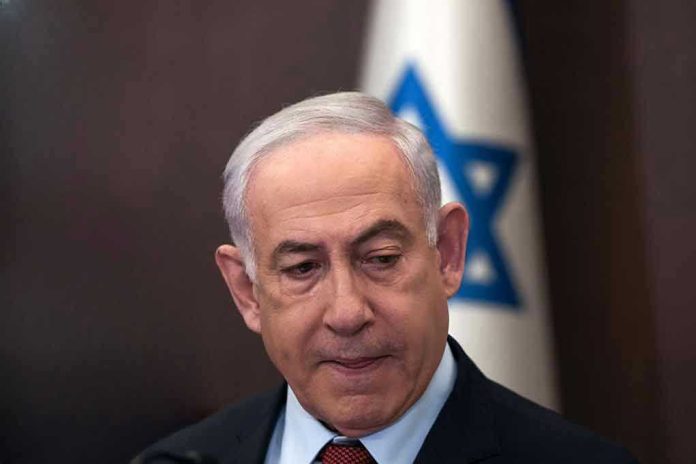
Netanyahu’s unexpected recall of Israel’s ceasefire negotiation team from Doha has left the world questioning what lies ahead for the tumultuous Israeli-Hamas negotiations.
At a Glance
- Benjamin Netanyahu recalls the Israeli negotiation team from Doha after Hamas’s new demands.
- Ceasefire talks are at a critical impasse with no immediate breakthrough expected.
- Hamas demands a permanent ceasefire and release of thousands of prisoners.
- The humanitarian crisis in Gaza worsens with mounting international pressure for a resolution.
Netanyahu’s Bold Move in Negotiation Tactics
Israeli Prime Minister Benjamin Netanyahu has taken a decisive step by recalling his ceasefire and hostage negotiation team from Doha, Qatar. This move comes after Hamas presented new demands that Israel found unacceptable. The recall does not mark the end of negotiations but highlights the deep divisions that continue to plague the peace process. Netanyahu’s decision underscores the complexity of achieving a lasting ceasefire and the high stakes involved for both parties.
Hamas’s latest demands included a clause to prevent Israel from resuming hostilities if a final agreement is not reached within a 60-day truce, the opening of the Rafah crossing, and the release of thousands of Palestinian prisoners. These demands have prompted Israel to re-evaluate its position, as they significantly alter the dynamics of the proposed truce.
Pressure Mounts Amid Humanitarian Crisis
The ongoing humanitarian crisis in Gaza adds another layer of urgency to the negotiations. With over 59,000 Palestinians reported killed since the start of the war, and widespread hunger and destruction, international pressure is mounting on both sides to reach an agreement. The recall of Israel’s negotiation team signifies a pause in direct talks, raising uncertainty about the immediate prospects for a ceasefire.
Both Israeli and Hamas leaderships are under intense domestic and international pressure to find a resolution. Israeli families are eagerly awaiting the return of hostages, while Palestinian families demand the release of prisoners. The humanitarian needs in Gaza continue to escalate, requiring immediate attention and resolution.
The Role of Mediators and International Stakeholders
Qatar and Egypt have been acting as principal mediators in the talks, with the United States playing a supporting role. The mediators aim to broker a sustainable agreement to prevent further escalation and address the critical humanitarian needs in Gaza. However, the recall of the Israeli team indicates that serious differences remain, and difficult decisions are ahead.
Mediators continue to engage with both parties, and while the talks are at a critical impasse, there remains hope that internal consultations could lead to a shift in positions or compromises. The outcome of these negotiations will have significant implications for regional stability and the broader Middle East dynamics.
Implications for Future Negotiations
If an agreement is not reached, the conflict may prolong, further exacerbating the humanitarian crisis and impacting regional stability. A successful deal could set a precedent for future negotiations and aid in the reconstruction and recovery efforts in Gaza.
The recall of the negotiation team illustrates the challenges of balancing military superiority with international scrutiny and domestic pressures. The decision-makers on both sides face significant constraints that limit their negotiating flexibility, and the outcome of these talks will test the credibility and influence of the mediators involved.







